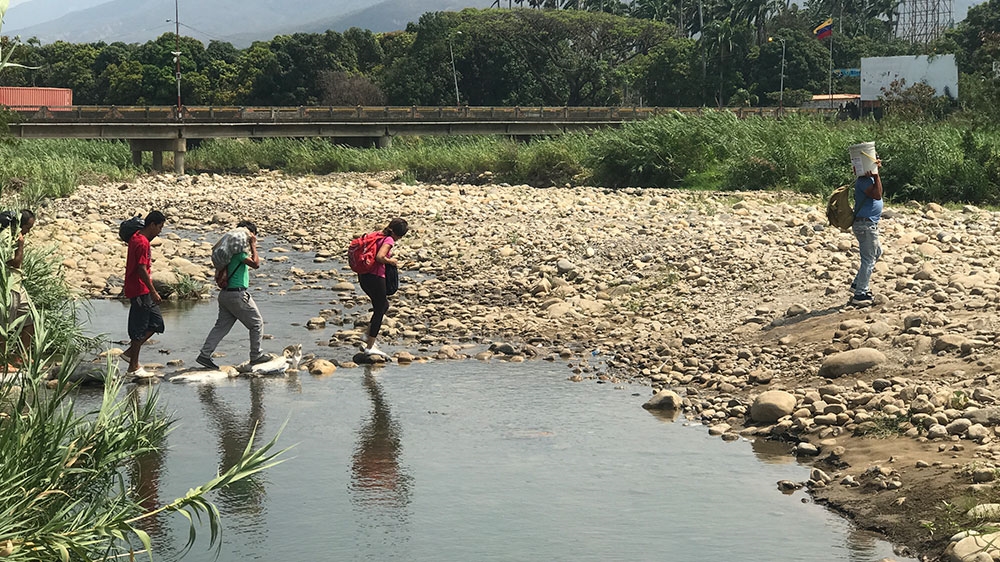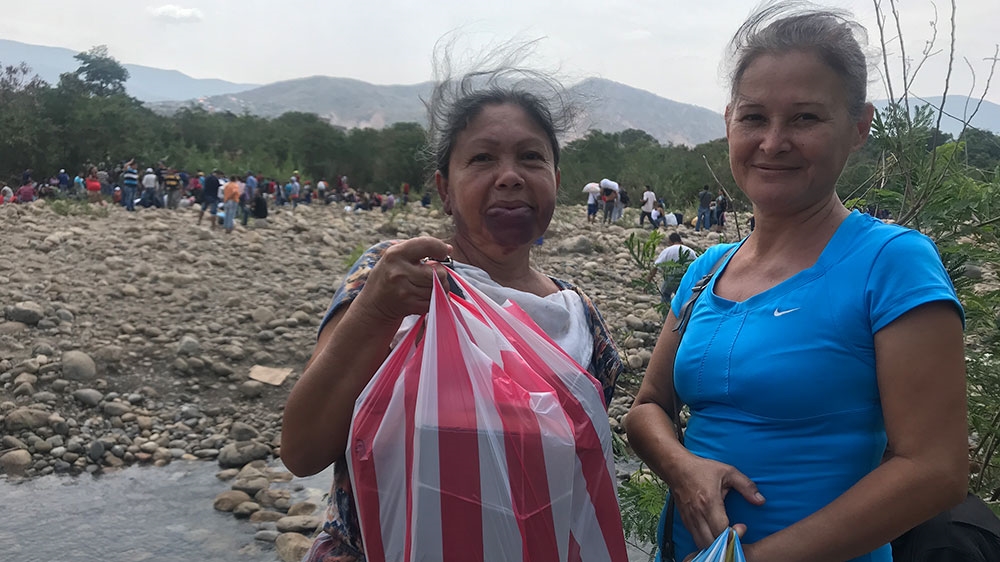
Cucuta, Colombia – Thousands of Venezuelans in search of food and medicine have entered Colombia through informal crossings after main border bridges were closed during last week’s attempted aid delivery.
The informal crossings, or “trochas” as they are referred to locally, are reportedly operated by illegal armed groups, who charge fees to let people pass. On the route, Venezuelans must step over rocks and cross a river.
“There are elderly people and children crossing over to study. I just saw an old lady being carried over in a wheelchair,” said Ana Luisa Cuellar, 36, standing with bags of toilet roll and rice beside the river she would have to cross to return home. It was the third time she crossed from Venezuela on the trocha this week.
“It’s dangerous because there is no security and the people who control it are from armed groups,” Cuellar said, while nervously looking around at who was listening to her speak. She said she had to pay the illegal groups 5,000 Colombian pesos ($1.60) to cross. “They make a fortune,” she added.
After last Saturday’s attempts to deliver US humanitarian aid into Venezuela by self-declared interim president Juan Guiado, the Simon Bolivar bridge was shut at President Nicolas Maduro‘s orders. Shipping containers filled with sand barricade the bridge, where more than 30,000 Venezuelans crossed daily to buy food and medicine unavailable in Venezuela.
 |
| When the border is open, more than 30,000 Venezuelans close the Simon Bolivar bridge daily [Steven Grattan/Al Jazeera] |
Venezuelans who depend on crossing the border to get basic products are feeling the strain of the border closure.
“Women and children are regularly exposed to violence, including risks of sexual violence and harassment. Additionally, fees are often required to cross,” said Bob Kitchen, the International Rescue Committee’s vice president for emergencies.
“Our teams report that upwards of 2,000 children are no longer be able to access school, as they made the journey from Venezuela to Colombia on a daily basis to receive their education,” he told Al Jazeera.
 |
| The International Rescue Committee reported an increase in the number of Venezuelans using informal crossings [Steven Grattan/Al Jazeera] |
The IRC also reported seeing an increase in walkers or ”caminantes”, with the spike beginning on Sunday and still on the increase.
“Teams report seeing an increase in the number of women and children, and in particular teenage boys who are afraid of being recruited into gangs in Venezuela,” Kitchen said.
Felipe Munoz, the Colombian government’s director of border issues, said that the move has hugely affected Venezuelan citizens.
“A very important thing to mention is ill people who need dialysis and cancer treatment and vaccines are unable to access these services,” he said, adding that because the routes are controlled by armed groups, Venezuelans are now at risk.
‘I’m dreading crossing’
The informal border crossing near the Simon Bolivar bridge was closed on late Friday morning for about an hour for unknown reasons, creating a buildup of Venezuelans trying to reach their home country.
Roger Moros, 39, laid on the ground of Colombian side of the trocha when the closure was announced. Surrounded by the goods he bought in Cucuta, which included chickens feet, sugar and flour, he said he had to pay 3,000 pesos ($1) to pass by.
“I’m not a fan of Guaido or Maduro, and I think the humanitarian aid is just a political weapon,” he said. “If it were really humanitarian aid why don’t they distribute it in Colombia so people can get access to it now?”
 |
| The IRC said that many Venezuelan children are unable to go to school due to the border closures [Steven Grattan/Al Jazeera] [Daylife] |
Another Venezuelan waiting to cross the river was Patricia Ortiz, 57, from San Antonio, just across the border.
“The aid should have gotten in for the people who need it,” she said stood beside her neighbour who she travels with once a week to Cucuta. “I’m dreading crossing,” she said staring at the river that separates Venezuela and Colombia.
 |
| Patricia Ortiz said she was dreading crossing the trochas [Steven Grattan/Al Jazeera] |












